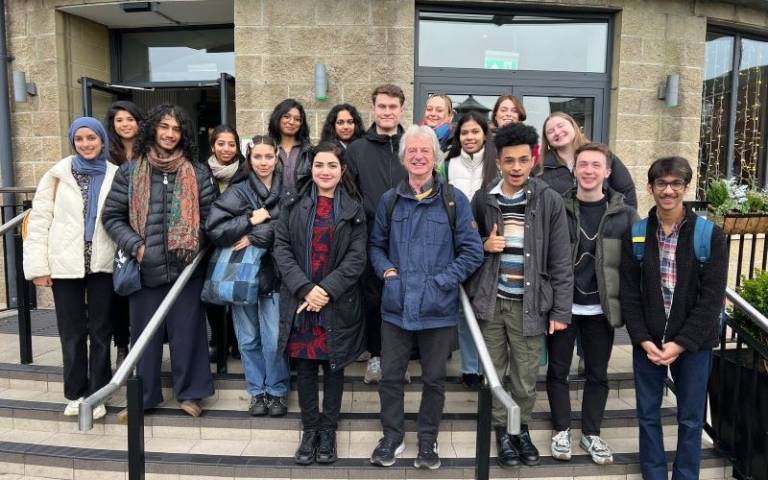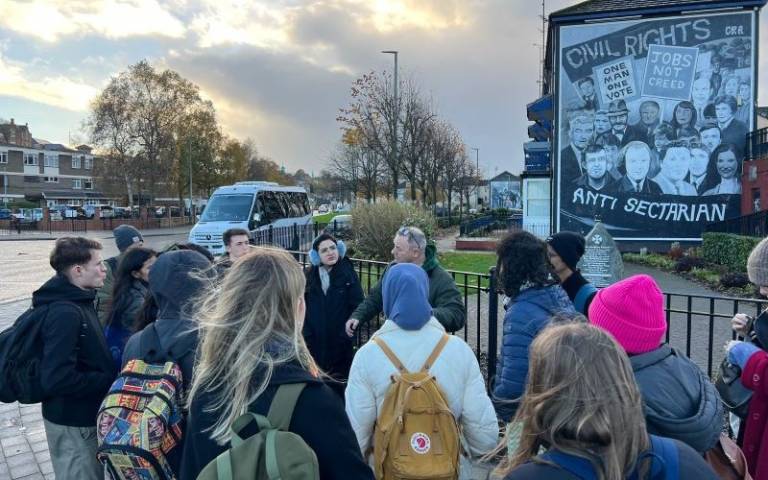Divided societies and coexistence: reflections from the Impartial Chairs’ trip to Northern Ireland
21 February 2024
Last November, Students’ Union UCL took 13 students to Northern Ireland, as part of the training for their new roles as Impartial Chairs. VPEE Student Journalist Sarah Jilani was one of them and reflects on her experience.

The Impartial Chairs Programme was launched last October as part of the university’s response to the Higher Education (Freedom of Speech) Act, which was passed in May 2023. The Act required higher education institutions and student unions to not only ensure, but to actively promote academic freedom and freedom of speech on campus. The Impartial Chairs programme has been developed to enable students to develop the skills to facilitate external speaker events on campus, to moderate and promote inclusive debate, and to navigate challenging discussions at UCL and beyond.
Learning outside the lecture theatre: into Northern Ireland
As well as taking part in a bespoke training programme, the Impartial Chairs were invited to participate in an experiential learning trip to Northern Ireland. The trip was described by participants as a ‘truly once in a lifetime experience,’ and I was incredibly grateful to be a part of it. The cohort of Impartial Chairs selected was a small proportion of those who applied, demonstrating the enthusiasm from UCL's student population to develop their skills in debate and respectful disagreement.
The participants had varied and numerous motivations for wanting to take part: for some, Northern Ireland held deep personal and familial significance, while for others, it provided an opportunity to develop their skills of navigating difficult conversations, whether that be in current academic settings, positions, or future careers. Many of us were keen to learn from the reconciliation process; how, after a period of intense conflict and violence, Northern Ireland has slowly begun to build itself back up again.
Through a collaboration between the Students’ Union and CIEL, the Centre for International Experiential Learning, we were able to encounter a new form of education – experiential learning. This was something I had not come across before, but proved to be an amazing opportunity. Through a range of tours, workshops, and conversations, we were able to gain a much deeper insight into the complexities of Northern Ireland, via interactions and engagements with the place and its people.
The coexistence of differing narratives
As a result of this, we were constantly being exposed to new ideas and voices, and one thing that stood out on the trip was the constant challenging of narratives. On the first full day of the trip, we were taken on a mural tour of the famous Falls Road and Shankill Road. The former is a predominantly known Republican and Catholic area, while the latter is a Unionist and Protestant area: the two are divided by what is known as the ‘peace wall’. Our tour was given in two halves, by two ex-combatants who were on opposite sides of the conflict during the Troubles. The stories they chose to tell, the accounts of major events, and even the language and rhetoric used differed vastly on either side of the peace wall.

And yet it was not that either was necessarily lying – people told their truth from what they themselves knew or had experienced. This was only the beginning of the trip, and from here onwards, we were struck by an awareness of the importance of not becoming complacent with what we were listening to. We must be careful of unquestioningly accepting everything we hear, but rather listen actively and carefully in order to understand the complexities of a situation.
Not just moving on from the past, but learning from it
One of the speakers said the way to view this was that ‘we have a shared history, but not a shared memory.’ This thought was shared in a panel discussion with a nationalist, loyalist, and former British soldier, a discussion which was widely regarded as a favourite amongst the Impartial Chairs. Despite the diametrically opposing political viewpoints held by the three members, they were able to not only exchange meaningful thoughts and ideas, but were also friendly and felt comfortable stating their views even if the others disagreed with it. This mindset of having empathy and understanding, even in the face of viewpoints you disagree with, was shown to be crucial to the peace process. It was something important for us, as Impartial Chairs, to take into account, as understanding this will enable us to facilitate safe spaces for respectful disagreement and discussion to take place.
This quality of empathy was notably not limited to those around them; many of the speakers openly expressed their opposition to current global injustices. Having lived through their own conflict, many of those we spoke to expressed a strong desire to keep others safe from violence, whether that be the future generations in Northern Ireland, or other countries or marginalised groups. Many of the people we spoke to frequently mentioned Palestine, and their murals not only depicted historical and political messages regarding Northern Ireland, but reflected the injustices in other countries as well. To me, it felt that though their own unrest had passed, having endured it, they recognised the importance of speaking up for those who couldn’t and implored us to do the same.
Looking to the future: the role of youth in continuing the peace process
This commitment to a peaceful future was also strongly expressed by the younger generation. On our final day of the trip, we spent some time talking to the students at Lagan College, the first all-ability integrated school in Northern Ireland. 93% of the schools in Northern Ireland remain segregated, yet Lagan College was founded by parents who wanted their children to be educated together. The students felt that integrated education benefitted them greatly, allowing them to interact with those from other communities and their ideas, which they may not have been exposed to outside of school. While managing integrated education poses its challenges, the school and the parents work hard to overcome them, as they firmly maintain the belief that dissolving the prominence of divisions in the youth would enable a more peaceful, less divisive future.
‘It was a full-on trip, a kind of absolutely packed programme, but in the best way – we were there, and we were in it.’ –Talia Bijwe-Alexander, Head of Intercultural Engagement, Students’ Union UCL
While Northern Ireland is still in the process of healing from its past, and elements of the divide linger today, we came away hopeful. A peaceful future is of utmost importance to those we talked to, as they continue to work across their differences in a multitude of ways.
For the Chairs, the trip was immersive and absolutely packed: one noted that hearing people’s first-hand experience was ‘a total privilege’, and allowed us to gain a much greater depth to our understanding of conflict. We became aware of our biases, and understood the need to set them aside at times and listen ‘merely for the sake of understanding.’
The lessons highlighted here form only a few of the many nuances in understanding which we developed in our time in Northern Ireland, a testament to the success of the trip, the willingness of the participants to learn, and the amazing efforts of the organising team.
Find out more
Visit the Students' Union UCL website to learn more about the Impartial Chairs programme.
Photo credit: Students' Union UCL.

About the author
Sarah Jilani is a second-year undergraduate at UCL, studying English Language and Literature. As someone who enjoys learning widely, she hopes to write articles to share lesser-known topics and issues with others as well as broaden her own knowledge. If you have a story you want to share, please contact her at sarah.jilani.22@ucl.ac.uk!
 Close
Close

